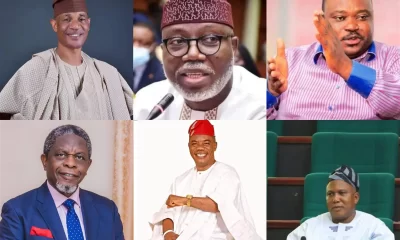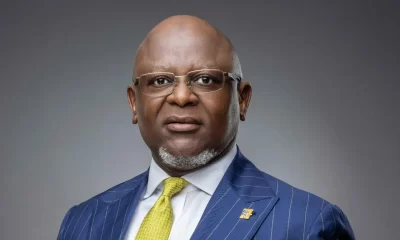Successive governments in Nigeria, both federal and state, have over the years continuously reminded me of my amiable late Uncle Ajayi from whom I originally assimilated the rudiments of communication.
Each time I tried to report on any assignment Uncle Ajayi gave me as a young chap, he effortlessly frustrated me by responding with so many statements unconnected to my report.
It took no less than a whole year of misery before I learnt that for him to comprehend whatever I said, I needed to speak towards his left ear only.
Whenever I mistakenly spoke generally to him, he neither heard nor understood me. In later years as a student of communication studies, my late Uncle’s posture became an asset as it helped me to comprehend the different dimensions of communication.
Uncle Ajayi’s stance was even more useful during my working career.
Following my harrowing experience with him because he was hard of hearing, I was able to fathom quite early that communication in government was generally clumsy – an observation that has remained true till today.
Apart from the huge gap between government and the people due to the inability of leaders to engage in effective public enlightenment, too many public officials are experts in selective hearing.
They hear only what they want to hear no matter the quantum of narrative on ground or the number of times the same things are repeatedly said to them.
The current storyline on the fuel subsidy removal aptly illustrates how people speak to one another as if all of them or some are deaf.
Nigerians had known since the electioneering period which started from the last quarter of 2022 that the policy of fuel subsidy had to go.
All the major candidates had the courage to state at every junction that they would end the policy if elected.
The government of the day even named the exact end-time because funds provided for the subject would have been exhausted at that point.
However, on its first day in office, the new government ended without saying anything about the balance of funds reportedly provided for it in the budget or why it had become unnecessary to wait till the appointed day.
It did not also bother to counsel us on the way forward after the removal.
In other words, in line with the nation’s subsisting mundane communication framework, the strategy on how the removal was to be managed was not included in the government statement.
Thereafter, the sermon became based on the virtues of patience with government, its officials and support groups continuously harping on the need for the people to endure.
There is nothing new about the approach because that is how public policy is usually implemented in Nigeria.
In other climes, before a road is closed for repairs, an alternative such as a diversion would have been provided, but in Nigeria, people are supposed to bear whatever inconveniences because at the end they might get a better road to use.
So, our people must bear with government on the imprecise austerity measures she has put in place to keep the nation going.
But then it is really not everyone that is required to persevere in pain, members of the national assembly are exempted because the only thing they understand is that they are the most important segment of democracy. Nothing else sticks.
Accordingly, while the rest of us are to remain patient, a token of N70billion is to be released to help new legislators settle in.
That should buy a few bullet-proof cars and a little renovation to their chambers and offices as well as some befitting furnitures.
Indeed, it may not be out of place to increase the convoys of their leaders.
As is usual with our absurd approach to communication, many legislators would come out to proffer the same old and illogical explanations about how it is not only legislators that work in the Assembly and that the legislature is a full arm of government.
No one would say anything about why the Judiciary is to get only half of what is provided for the legislature or is the Judiciary not a full arm of government?
It is only within the realm of the communication of the deaf that people can imagine that our legislature is bigger in size and in need than our Judiciary.
Painfully, although legislators are well paid in the context of the Nigerian public service remuneration package, they have also become rash parasites on the nation’s wealth, extorting an inexplicable portion of the annual budget.
Speaking at the 2010 convocation of the Igbinedion University Okada, Sanusi Lamido who was then Governor of the Central Bank revealed that legislators were consuming 25 percent of Nigeria’s yearly budget.
On his part, renowned legal luminary Itse Sagay quoted figures which showed that Nigerian legislators earned much higher salaries than their British and American colleagues.
Richard Dowden, Executive Director of the Royal African Society in London told the government of Goodluck Jonathan at the 2011 Independence Day Lecture, that our legislators were the highest paid in the world.
Rather than take steps to stop the scandal, the executive arm of government has continued to pamper legislators in return for spurious approvals.
The intention of this piece is not to suggest that legislators are not important.
They certainly are especially when they make crucial laws for good governance but there are two areas where our legislators need a rethink.
First, they need to know that their viewpoint which continuously perceives the legislature as the highest democratic feature is incorrect.
The highest feature of democracy is the sovereignty of the people. It is the people who ought to matter the most and not their representatives.
Secondly, the argument that legislators deserve more funding because they are the first the people turn to for the dividends of democracy is superfluous.
Legislators must keep to the scope of their assignment and allow citizens to understand that the legislature is strictly for law-making, thereby helping people to gradually know the reality so as to keep to what democracy prescribes.
The executive must be allowed to do its job of executing policies and taking responsibility for them.
ALSO READ: Something fishy in our waters
If that is done, that arm may be forced to abandon its escapist inclination of monotonous speeches about subsidy removal.
Those of them preaching the sermon on patience might then see the expedience of publicising the extent to which government itself has leaned towards any form of austerity.
Since the Buhari years, there has been no reduction in the nation’s transparent jumbo cost of governance.
In the 2023 budget for instance, there is a provision of N508.71 million for feeding our president and his vice and their families; yet, the American president and the British prime minister pay for their family food bills.
In Nigeria on the contrary, almost every chieftain of the ruling party has formed a habit of holding partisan banquet meetings in our own seat of government.
In other areas such as government travels, the nation is yet to know why there should continue to be 10 planes in the presidential fleet.
It is therefore difficult for government to carry on with its business as usual attitude and expect the call on citizens for patience to attract adherents.
Many Nigerians may have heard of an investigative report by a leading national newspaper that in the last two years, thirteen state governors spent N14.84bn to sponsor no fewer than 4,771 persons on religious pilgrimage in a country with no state religion.
But then, even the lucky pilgrims are not likely to be patient in the face of today’s biting cost of food items and transportation.
To make matters worse, the subsisting communication on subsidy removal has blocked the government from hearing calls for her to lead by example.
In the 70s, the Murtala/Obasanjo administration instructively adopted low profile in reaction to the same dilemma of Nigeria finding itself in a precarious financial situation.
Among other prudent strategies, the locally made Peugeot 504 was made the official car of the Head of state while all extravagant government expenditures were halted. Everyone fell in line.
If the Nigerian people are lucky to see such body language now, public communication would be better appreciated because examples are better than precepts.

















